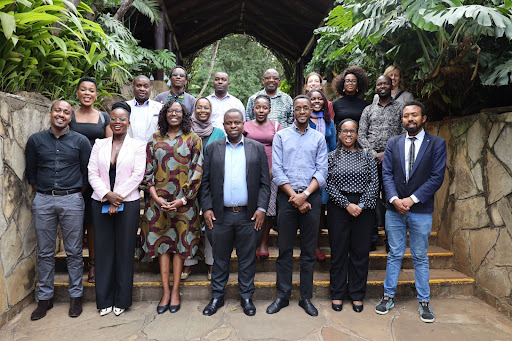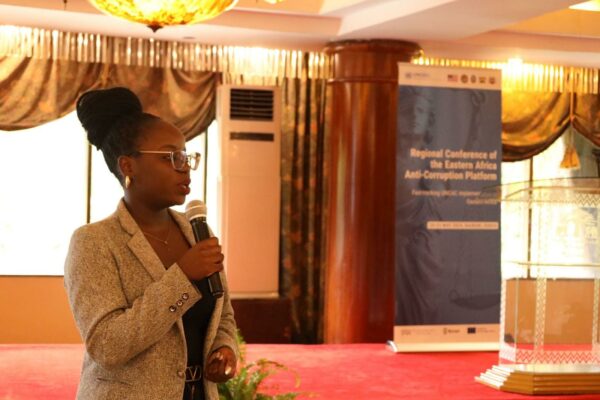12 June 2024 –
The East Africa Anti-Corruption Platform was convened in Nairobi from May 20th to 23rd, 2024, with a renewed commitment to revive the regional platform and fast-track UNCAC implementation in Eastern Africa. The conference, held under the framework of the regional platform approach endorsed by the Conference of the States Parties (CoSP) Resolution 9/4, aimed to address pressing challenges and identify strategic priorities for collective action in the region.

The establishment of the East Africa Anti-Corruption Platform in February 2017 marked a significant milestone in the collective effort to combat corruption in the region. Convened by civil society organisations (CSOs) and members of the East African Association of Anti-Corruption Authorities (EAAACA), the platform emerged from the 2017 regional conference in Nairobi dedicated to fast-tracking the implementation of the United Nations Convention against Corruption (UNCAC). During this Conference, representatives from government bodies and CSOs across the eight countries of the East Africa region came together to identify four key thematic priorities in combating and addressing corruption: financial investigations, public procurement, whistleblower protection, and international cooperation. EAAACA Member Countries include: Burundi, Djibouti, Democratic Republic of the Congo, Ethiopia, Kenya, Rwanda, South Sudan, Tanzania, and Uganda, and Somalia.
In the years following the establishment of the platform, both government bodies and civil society undertook various initiatives aimed at advocating for greater accountability, integrity, and the protection of whistleblowers. The platform provided crucial support to CSOs through grants awarded to organisations in Rwanda, Ethiopia, Kenya, Uganda, and South Sudan, enabling them to execute anti-corruption projects focused on public procurement or whistleblower protection. However, the momentum generated by the platform gradually waned in the face of external challenges, most notably the outbreak of the COVID-19 pandemic. Despite the urgent need for strengthened anti-corruption measures during this tumultuous period, engagement in the platform declined, leaving a void in the region’s collective efforts to combat corruption. The pandemic exacerbated existing vulnerabilities and created new opportunities for fraudulent activities, underscoring the critical importance of maintaining robust anti-corruption initiatives.
Critical Thematic Areas to Combating Corruption
Against this backdrop, at the conference in May 2024 stakeholders from governments and civil society focused on four thematic areas critical to combating corruption in Eastern Africa: asset recovery and financial investigations, whistleblower protection, public procurement and integrity systems and private sector collective action against corruption.

The outcomes of discussions amongst civil society and development partners on the conference thematic topics can be summarised as follows:
1. Asset recovery and financial investigations
Significant progress has been made in asset recovery efforts, marked by the establishment of dedicated Asset Recovery Offices (AROs) in countries such as Uganda, Kenya, Ethiopia, and Tanzania. Legislative reforms in these countries have also empowered authorities with enhanced tools for asset tracing, freezing, confiscating, and repatriating stolen assets. Furthermore, interagency networks have facilitated coordination and information sharing, while initiatives such as non-conviction-based forfeiture and the African Union’s Common African Position on Asset Recovery (CAPAR) have set common standards and bolstered regional cooperation.
2. Whistleblower protection
Despite some advancements in the region, whistleblower protection remains a critical issue in Eastern Africa. Many countries lack comprehensive legal frameworks to safeguard whistleblowers, leaving investigative journalists, civil society actors, and other reporting persons vulnerable to retaliation. There is a need for advocacy efforts to focus on protecting whistleblowers from civil and criminal liabilities, particularly those operating in sensitive sectors such as state security and defence.
3. Public procurement and integrity systems
Public procurement continues to be undermined by corruption and a lack of transparency in Eastern Africa, indicating an urgent need for the disclosure of procurement information based on open contracting data standards to ensure accountability. Media and investigative journalist involvement is also crucial for scrutinising procurement processes and ensuring transparency. Additionally, the disclosure of beneficial ownership information and gender-disaggregated data is essential for fostering inclusivity and equity in public procurement processes.
4. Private sector collective action against corruption
While the private sector is recognized for its potential to combat corruption, it grapples with weak regulatory frameworks and insufficient engagement in anti-corruption initiatives. The limited involvement of private sector stakeholders in policy formulation highlights a critical gap in fostering collective action against corruption. There is therefore an urgent need for efforts focused on strengthening regulatory frameworks, enhancing corporate transparency, and supporting small and medium-sized enterprises (SMEs) in implementing anti-corruption measures.
Missed Opportunity for Inclusion
The conference missed a critical opportunity to explicitly address the intersecting challenges of gender and corruption, and for more inclusive and impactful initiatives that address the unique vulnerabilities faced by women in Eastern Africa. Women bear a disproportionate burden of corruption’s effects, yet gender considerations were not acknowledged as a key priority area within the East Africa Anti-Corruption Platform.
In asset recovery and financial investigations, gender considerations are essential to ensure equitable distribution of recovered assets and to mitigate the disproportionate impact of corruption on vulnerable populations, including women and girls. Similarly, in whistleblower protection, gender-sensitive policies are needed to safeguard women whistleblowers, who may face heightened risks of retaliation and marginalisation. In public procurement and integrity systems, addressing gender disparities in access to procurement opportunities and ensuring the inclusion of gender-disaggregated data can help identify and rectify systemic inequalities. Finally, promoting gender diversity and inclusivity within the private sector is essential for enhancing corporate transparency and accountability, as well as for empowering women entrepreneurs to participate fully in economic development initiatives.
Governments need to be more intentional in addressing gendered forms of corruption, such as sexual corruption and ensure compliance with international human rights laws and standards that are key to addressing the disproportionate impact of corruption on marginalised groups, such as women, LGBTQIA+ individuals, persons with disabilities, older people, children, minorities, refugees, migrants, and internally displaced persons. Adopting or strengthening affirmative action policies is also essential to redress historical power imbalances that exacerbate gendered forms of corruption.
Call to action
As stakeholders reflect on the outcomes of the conference and chart a path forward, it is imperative to recognise that CSOs in the region continue to play a vital role in advocating for transparency, accountability, and integrity in governance. Governments in the region and UNODC must ensure their meaningful participation in the East Africa Anti-Corruption Platform and UNCAC monitoring processes, by providing them with the necessary support and resources. This will amplify the voices of ordinary citizens and help to hold governments accountable for their actions. Additionally, securing high-level political commitment is imperative for the effective implementation of UNCAC in East Africa. To accomplish this, governments must prioritise anti-corruption efforts and allocate sufficient resources to support UNCAC implementation initiatives.
Finally, addressing the gender dimensions of corruption is crucial. Governments need to be intentional about integrating gender considerations into anti-corruption efforts, including mainstreaming gender equality in policy frameworks, ensuring the meaningful participation of women in decision-making processes, and addressing the unique challenges faced by women and other marginalised groups in combating corruption.
The Conference Outcome Statement is forthcoming on this website, and the CSO statement here.



